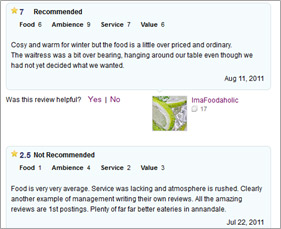 Whether you like it or not, customers are expressing their opinions on the internet. While professional restaurant critics such as Matthew Evans of Fairfax can be sued , the same rules don’t seem to apply for anonymous online reviewers.
Whether you like it or not, customers are expressing their opinions on the internet. While professional restaurant critics such as Matthew Evans of Fairfax can be sued , the same rules don’t seem to apply for anonymous online reviewers.
Websites like Eatability, Urbanspoon, Trip Advisor and Yelp are so popular, new directory and customer rating websites are springing up every week! There has been controversy as to whether some of these reviews have been sabotage from competitors, or paid by owners to companies to write dozens of glowing reviews.  The New York Times recently ran an article about fake reviews, and reading through Eatability comments, it seems customers are suspicious when there are extremely good reviews in amongst really bad ones.
The New York Times recently ran an article about fake reviews, and reading through Eatability comments, it seems customers are suspicious when there are extremely good reviews in amongst really bad ones.
So as a restaurant or cafe owner, what can you do when potential customers are making their minds up based on bad comments found on social media and customer review websites?
A few tips:
- Search for your restaurant or cafe. Read through the Eatability, Urban Spoon and YELP! comments. Good or bad, you need to know. Be open to criticism. If there’s a pattern of bad reviews, you must investigate further via mystery shoppers! Expensive marketing campaigns won’t salvage a restaurant with bad food or service.
- Encourage voting.
 If you think the comments are unfair, encourage more satisfied customers to write reviews. Some restaurants even go so far as taking an iPad to diners at the end of the meal. UrbanSpoon have a widget you can add to the Home page of your website.
If you think the comments are unfair, encourage more satisfied customers to write reviews. Some restaurants even go so far as taking an iPad to diners at the end of the meal. UrbanSpoon have a widget you can add to the Home page of your website. - Address comments on review websites or social media.
 Any feedback is better than no feedback. Don’t be stuck with an empty restaurant, scratching your head wondering why. We have also seen new restaurant owners who have inherited bad online reviews announce “Change of Management” or “New chef!” on their websites and on Eatability and Urbanspoon. If this is true, then let potential customers know. Don’t go down without a fight!
Any feedback is better than no feedback. Don’t be stuck with an empty restaurant, scratching your head wondering why. We have also seen new restaurant owners who have inherited bad online reviews announce “Change of Management” or “New chef!” on their websites and on Eatability and Urbanspoon. If this is true, then let potential customers know. Don’t go down without a fight! - Publish good feedback on your own website. When potential customers read a bad review, often curiosity makes them check out your website just to make sure.
The worse thing to do is to ignore bad reviews and let dissatisfied customers scare aware potential customers. Successful restaurant marketing is where restaurateurs take notice of customer comments, and proactively try and improve the business.
You may also like:
How much should a Restaurant website cost?
Marketing your Restaurant. Does this sound like you?
Also read: Best Tips for Groupon and Living Social Marketing for Restaurants and Cafes
Is Poor SEO Killing Your Restaurant?
Too many times we see customers with websites that are costing restaurants thousands of dollars every month through poor design, poor messaging and poor SEO. If your website could be improved to bring in 200 extra visits per month and just 10% of those made a booking, and each booking was for 2.5 seats on average at $50 a seat, you would have an extra $2,500 in revenue a month. A 30% food cost, that is $1,750 in profit extra a month. This ignores those customers coming back as regulars – which is more profit.
Remember, if these customers aren’t finding your Restaurant, they are finding your competitors.
Get one of our obligation free 7 point website SEO audits to see what you can get your web developer to fix to increase your revenue today.

